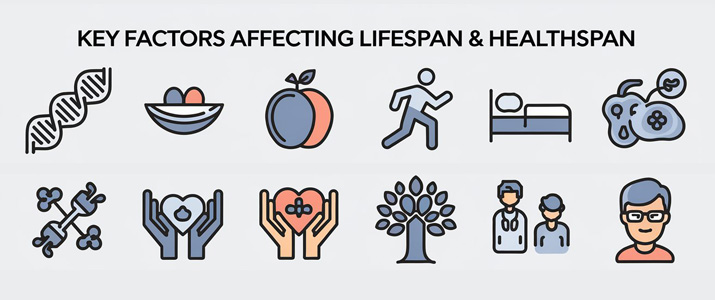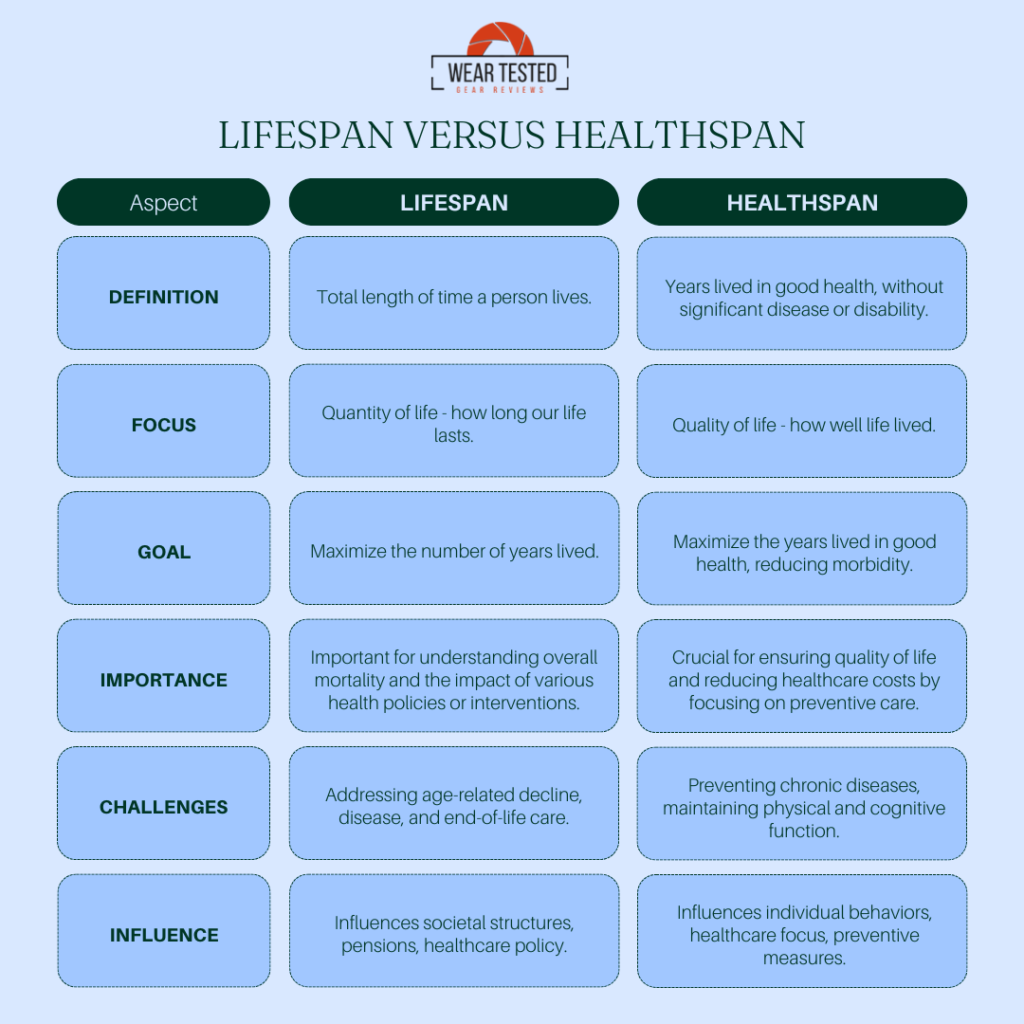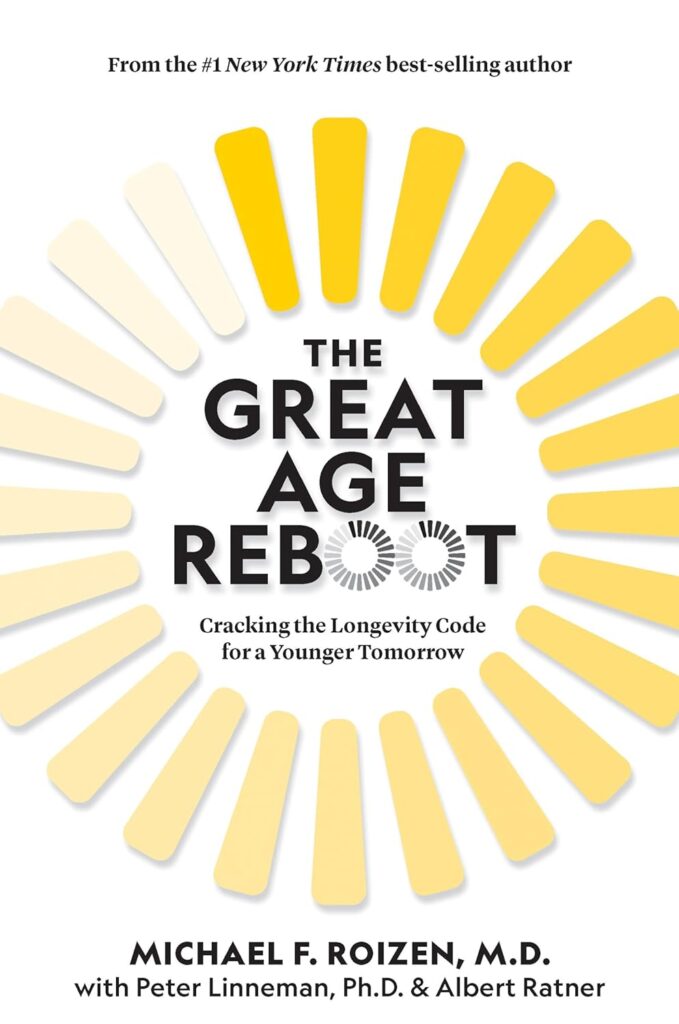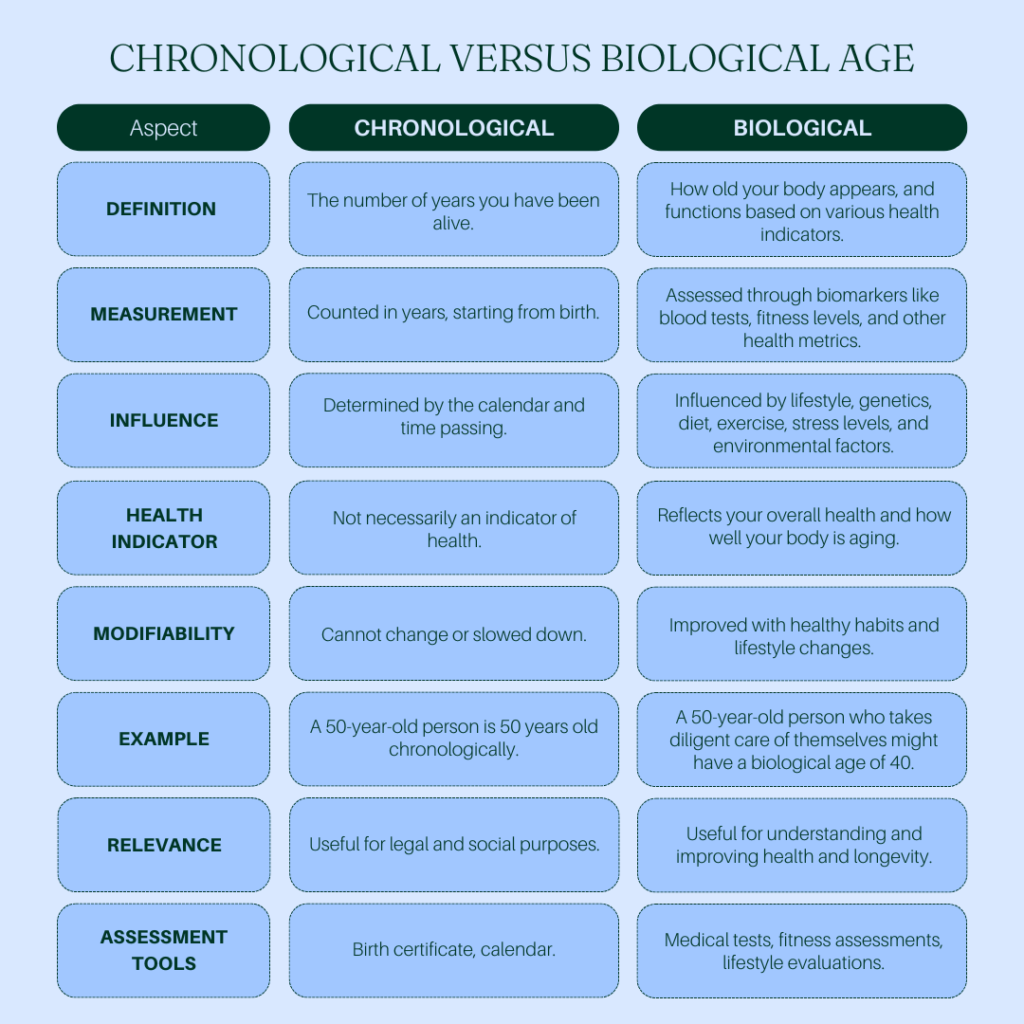The content in this article should not be taken as medical advice. Please consult with your healthcare provider regarding your individual health needs.
In our continuing series on Longevity, let’s delve into something more important than lifespan and chronological age – healthspan, diseasespan, and biological age. A good clear definition is to get everyone on the same page.
Longevity Series
- Centenarian Decathlon (Living Strong and Healthy at 100)
- Healthspan & Biological Age (Maximize Health, Minimize Disease)
Definitions
TLDR;
- Lifespan: Total years lived from birth to death.
- Healthspan: Years lived in good health, free from chronic diseases.
- Diseasespan: The period in life when chronic illnesses impair one’s quality of life.
- Biological Age: How old your body appears, and functions based on various health indicators.
- Chronological Age: The number of years you have been alive.
Lifespan
- Definition: Lifespan is the total number of years an individual lives, from birth to death, regardless of their health status.
- Focus: It is a measure of longevity without considering the quality of those years in terms of health.
Healthspan
- Definition: Healthspan refers to the number of years an individual lives in good health, free from chronic diseases and disabilities associated with aging.
- Focus: It emphasizes the quality of life, aiming for a period of life spent in good health rather than just focusing on the total number of years lived.
Chronological Age
- Definition: Chronological age is the straightforward measure of the time that has passed since a person’s birth, expressed in years, months, and days.
- Measurement: It is a simple calculation based on the date of birth and does not change regardless of a person’s health or lifestyle.
Biological Age
- Definition: Biological age, also known as physiological or functional age, reflects how well or poorly your body is functioning relative to your chronological age. Influenced by genetics, lifestyle, nutrition, and the presence of diseases.
- Measurement: Biological age estimated using various biomarkers and mathematical models. These biomarkers can include telomere length, DNA methylation patterns, and other physiological indicators. Age estimate requires integration of biomarkers with multiple linear regression, principal component analysis, and machine learning models.
Diseasespan
- Definition: Diseasespan, also known as the period of morbidity, refers to the length of time a person lives with chronic diseases, disabilities, or significant health impairments that reduce their quality of life.
- Focus: The primary focus of diseasespan is on the duration and impact of illnesses and health conditions that affect an individual’s ability to live independently and enjoy life.
Healthspan versus Lifespan
Healthspan refers to the period of a person’s life during which they are healthy and free from serious or chronic illness. It is distinct from lifespan, which is the total length of time a person lives. The concept of healthspan focuses on the quality of life and well-being, emphasizing the importance of maintaining physical, mental, and emotional health to ensure that one’s later years are in good health, rather than just aiming to prolong life regardless of health conditions. The goal of increasing healthspan is to maximize the years of life spent in vibrant, active health, reducing the period of morbidity commonly associated with old age.
A typical human lifespan varies by country, lifestyle, and numerous other factors, but on average:
- In many developed countries, the average lifespan is around 80 years.
- In less developed countries, it can be lower, often around 60-70 years.
Key Factors Affecting Lifespan & Healthspan
Several factors influence both lifespan and healthspan, impacting how long we live and the quality of our health during those years.
- Genetics: Genetic predispositions can play a significant role in determining susceptibility to various diseases and overall longevity.
- Diet and Nutrition: What we eat significantly impacts our health. Diets rich in fruits, vegetables, lean proteins, and whole grains can improve longevity and reduce the risk of chronic diseases.
- Physical Activity: Regular exercise is associated with longer life and fewer health problems. It benefits heart health, muscle strength, balance, and brain function.
- Sleep: Quality and quantity of sleep affect physical health and cognitive function. Poor sleep patterns cause cardiovascular disease and reduce immune function.
- Stress and Mental Health: Chronic stress and untreated mental health conditions like depression and anxiety can diminish healthspan and adversely affect lifespan.
- Social Connections: Strong social ties and a supportive community can lead to a longer, healthier life. Loneliness and social isolation correlate with poorer health outcomes.
- Environmental Factors: Pollution, exposure to toxins, and living conditions can influence overall health and longevity. Safe, clean environments support better health.
- Healthcare Access: Access to preventive healthcare and timely treatment of illnesses is crucial for maintaining good health and extending both lifespan and healthspan.
- Lifestyle Choices: Smoking, alcohol use, and other lifestyle factors directly impact health. Avoiding harmful habits can significantly improve life expectancy and quality.
- Educational Attainment: Education level leads to better health outcomes due to increased health knowledge, healthier behaviors, and better economic stability.
These factors interact in complex ways, often compounding to either bolster health and longevity or detract from them. Effective management of these elements can help maximize both lifespan and healthspan.
Chronological Age versus Biological Age
Distinguishing between chronological and biological age is crucial because it highlights that aging is not solely a function of time. Biological age provides a more accurate reflection of an individual’s health status and potential longevity, accounting for both intrinsic factors (like genetics) and extrinsic factors (like lifestyle and environment). This understanding can guide personalized health strategies and interventions to promote healthy aging and longevity.
Reliable Biomarkers for estimating Biological Age
Estimating biological age involves assessing biomarkers that provide insights into an individual’s physiological state and the aging process. Reliable biomarkers for estimating biological age reflect various aspects of health and aging, including cellular function, genetic factors, metabolic health, and physical capabilities. Here are some of the most reliable biomarkers used to estimate biological age:
Epigenetic Clocks
Epigenetic clocks (particularly those based on DNA methylation patterns) are the most reliable and accurate biological age predictors. These patterns change predictably with age and can provide a highly accurate estimate of biological age.
- DNA methylation age correlates strongly with chronological age and predicts mortality, frailty, cognition, physical function, and various age-related diseases.
- Epigenetic clocks have shown high accuracy in predicting 5-year or 10-year mortality, suggesting they are good predictors of life expectancy.
- They are based on specific DNA methylation sites that change with age.
Telomere Length
While not as accurate as epigenetic clocks, telomere length remains one of the most well-studied biological age predictors. Telomeres are protective caps at the ends of chromosomes that shorten with each cell division. Over time, as telomeres become critically short, cells enter senescence or apoptosis (programmed cell death).
- Measured typically by qPCR or Southern blot techniques.
- Associated with mortality, cancer, cardiovascular disease, Alzheimer’s disease, physical function, and cognition.
- However, some studies have dropped telomere length due to controversies about its measurement.
Blood-Based Biomarkers
- Blood Glucose Levels: Elevated fasting blood glucose and HbA1c levels (a measure of long-term blood sugar control) can indicate metabolic aging and are associated with increased risk of age-related diseases like diabetes.
- Cholesterol Levels: Lipid profiles, including total cholesterol, LDL cholesterol (bad cholesterol), and HDL cholesterol (good cholesterol), are important for assessing cardiovascular health and biological age.
- Inflammatory Markers: Chronic inflammation is a hallmark of aging, often referred to as “inflammaging.” Systemic inflammation levels assessed using biomarkers such as C-reactive protein (CRP), interleukin-6 (IL-6), and tumor necrosis factor-alpha (TNF-α).
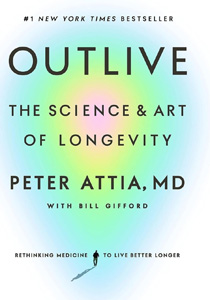
“The logical conclusion is that we need to step in sooner to try to stop the Horsemen in their tracks—or better yet, prevent them altogether… We want to delay or prevent these conditions so that we can live longer without disease, rather than lingering with disease.”
Peter Attia
Extending Healthspan (Scientifically Proven Ways)
Extending healthspan has become a significant focus of modern aging research. Several scientifically proven strategies can help individuals extend their healthspan by promoting overall health, preventing age-related diseases, and maintaining physical and cognitive function. Here are some key approaches:
Lifestyle Factors
- Healthy Diet: Adopting eating patterns such as the DASH, MIND, or Mediterranean diets can significantly lower the risk of age-related chronic conditions like hypertension and dementia.
- Balanced Diet: Consuming a diet rich in fruits, vegetables, whole grains, lean proteins, and healthy fats (like those found in nuts, seeds, and fish) provides essential nutrients and antioxidants that support overall health and reduce inflammation.
- Caloric Restriction: Studies have shown that moderate caloric restriction without malnutrition can extend lifespan and healthspan in various organisms. In humans, caloric restriction is associated with improved metabolic health, reduced inflammation, and delayed onset of age-related diseases.
- Intermittent Fasting: Intermittent fasting (e.g., time-restricted eating or alternate-day fasting) to improve metabolic health, enhance cellular repair processes, and reduce the risk of chronic diseases, contributing to a longer healthspan.
- Regular Exercise: A combination of cardiovascular exercises, strength training, and flexibility exercises.
- Aerobic Exercise: Engaging in regular aerobic exercises such as walking, jogging, cycling, or swimming to improve cardiovascular health, enhance lung capacity, and reduce the risk of chronic diseases like heart disease, diabetes, and obesity. Exercise also helps maintain a healthy weight and supports metabolic health.
- Strength Training: Resistance training or weightlifting helps maintain muscle mass, bone density, and overall strength. This is particularly important as muscle loss (sarcopenia) and bone loss (osteoporosis) are common with aging and can lead to frailty and falls.
- Flexibility and Balance Exercises: Activities like yoga, Pilates, and tai chi improve flexibility, balance, and coordination, which are essential for preventing falls and maintaining mobility as we age.
- Adequate Sleep: Getting 7-9 hours of quality sleep per night is essential for mental health, cognitive function, mood, and cardiovascular health.
- Stress Management: Practicing mindfulness, meditation, and relaxation techniques can reduce stress levels and improve overall well-being including cardiovascular disease, depression, and cognitive decline.
- Social Connections: Maintaining quality social connections is important for overall health and longevity.
- Strong Social Networks: Maintaining strong social connections and a robust support network is associated with better mental and physical health, reduced stress levels, and increased longevity. Social isolation and loneliness cause a higher risk of mortality and cognitive decline.
- Cognitive Stimulation: Engaging in mentally stimulating activities such as reading, puzzles, learning new skills, and socializing can help maintain cognitive function and reduce the risk of dementia and other cognitive impairments.
Health Behaviors
- Avoid Smoking: Smoking is one of the most significant risk factors for a wide range of diseases, including cancer, heart disease, and respiratory illnesses. Quitting smoking can significantly improve health and extend both lifespan and healthspan.
- Moderate Alcohol Consumption: Excessive alcohol consumption causes liver disease, cardiovascular problems, and an increased risk of certain cancers. Moderation is key, with many health guidelines recommending no more than one drink per day for women and two for men.
- Maintaining Healthy Weight: Maintaining a healthy weight through a balanced diet and regular exercise reduces the risk of many age-related conditions, such as cardiovascular disease, type 2 diabetes, and certain cancers. Excess body fat, especially visceral fat, is associated with inflammation and metabolic dysregulation.
Medical Interventions
- Preventive Healthcare: Regular check-ups and age-appropriate screenings (such as blood pressure, cholesterol, cancer screenings, and others) help detect potential health issues early, allowing for timely interventions that can prevent disease progression and improve health outcomes.
- Vaccinations: Staying up to date with vaccinations, including those for flu, pneumonia, and shingles, can help prevent infections that are more severe in older adults.
Emerging Research Areas
- Anti-Senescence Therapies: Research is ongoing into treatments that target senescent cells, which accumulate with age and contribute to age-related diseases.
- Genomic Stability: Protecting DNA from damage and promoting efficient DNA repair are critical for maintaining cellular function and reducing cancer risk. Emerging therapies targeting genomic and epigenetic stability show slowdown in aging process and extending healthspan.
- Epigenetic Reprogramming: Scientists are exploring techniques like epigenetic reprogramming to reverse cellular aging and rejuvenate cells, although this research is still in the initial stages and not yet applicable in clinical settings.
It’s important to note that healthspan is a holistic concept, and the most effective approach involves combining multiple strategies.
What’s Next?
Now that you know how various behaviors and factors affect your lifespan, healthspan, and biological age, what changes are you willing to make to extend your healthspan and biological age while minimizing diseasespan?
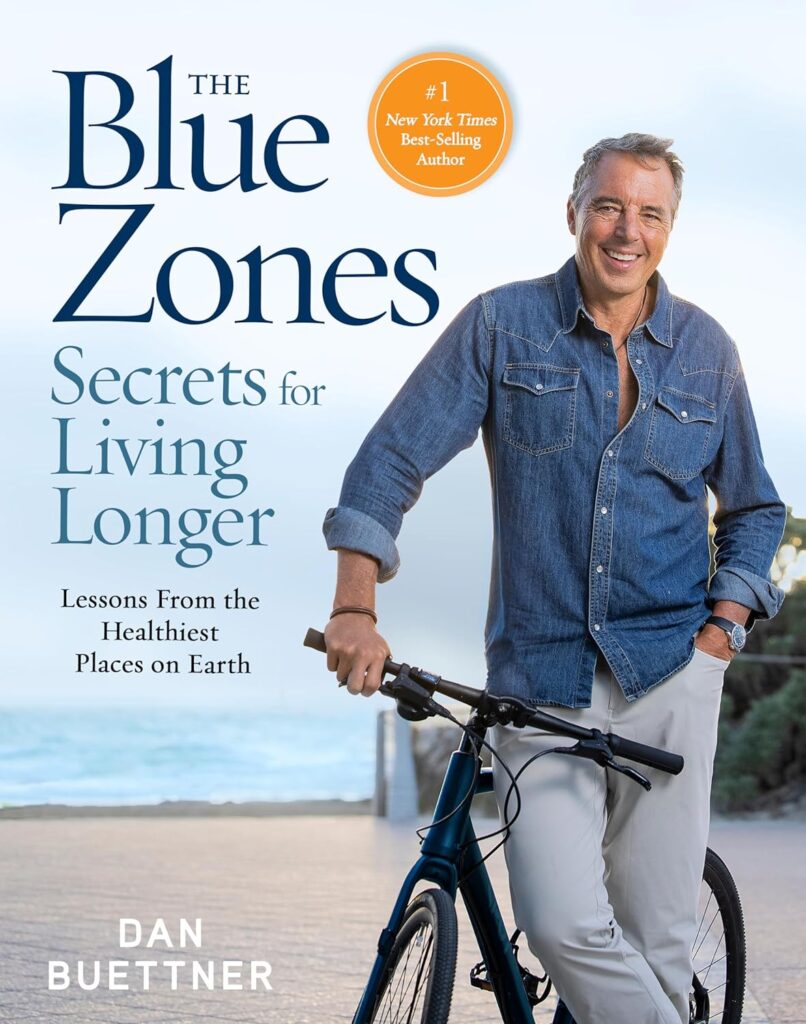
“To live longer, better lives, we must emulate the simple yet profound practices of those who have mastered the art of longevity.”
Dan Buettner
Longevity book summary articles including ‘Outlive‘ from Knowledge Unlocked, our sister publication.
- The Ancient Secret to Modern Mindfulness Through Fasting (The Fast)
- The Happiness Blueprint You Need for a Joyful Life (The Blue Zones of Happiness)
- Science-Backed Hacks for a Younger, Healthier You (How Not To Age)
- Discover the Blue Zones Formula for a Long Life (The Blue Zones)
- Transform Your Healthspan with Science-Backed Longevity Hacks (Outlive)
- The Future of Aging: 90 is the New 40 (The Great Age Reboot)

